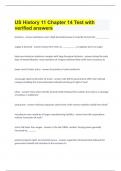US History
Havard School
Page 2 out of 25 results
Sort by
US History 11 Chapter 14 Test with verified answers.
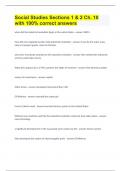
-
Social Studies Sections 1 & 2 Ch. 10 with 100% correct answers
- Exam (elaborations) • 3 pages • 2023
-
- $15.49
- + learn more
when did the industrial revolution begin in the united states 1800's How did new englands location help industrial revolution it was by the water ways, easy to transport goods, close by factories why were merchants essential to the industrial revolution they needed the industries so they could make money What did congress do in 1790 to protect the rights of inventors they formed a patten money for investment capital Oliver Evans developed mechanical flou...
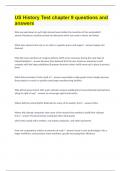
-
US History Test chapter 9 questions and answers
- Exam (elaborations) • 5 pages • 2023
-
- $15.49
- + learn more
Why was petroleum in such high demand even before the invention of the automobile? Petroleum could be turned into kerosene which was used in stoves and lamps What does Laissez-Faire rely on in order to regulate prices and wages? Supply and demand Why did many members of congress believe tariffs were necessary during the early days of industrialization? Because they believed that the new American industries could compete with the large established European factories unless tariff...
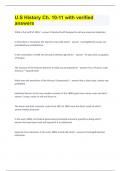
-
U.S History Ch. 10-11 with verified answers
- Exam (elaborations) • 5 pages • 2023
-
- $15.49
- + learn more
What is the tariff of 1816? Protected tariff designed to aid new american industries In McCulloch v. Maryland, the Supreme Court did what? *end legitiment means not prohibited law constitutional In the convention of 1818, the US and Grt Britain agreed to? *10 year joint occupation of Oregon The issuance of the Monroe Doctrine in 1823 was prompted by? Fear of France/ Latin America/**Spanish Rule What were the provisions of the Missouri Compromise? Was a slave stat...
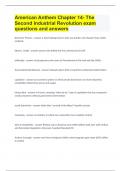
-
American Anthem Chapter 14- The Second Industrial Revolution exam questions and answers
- Exam (elaborations) • 3 pages • 2023
-
- $14.99
- + learn more
Bessemer Process a steel-making process that was quicker and cheaper than earlier methods Edwin L. Drake person who drilled the first commercial oil well wildcatter oil prospectors who came to Pennsylvania in the mid and late 1800s Transcontinental Railroad railroad system that crossed the continental United States capitalism an economic system in which private businesses run most industries; competition determines prices and wages laissez-faire In French...
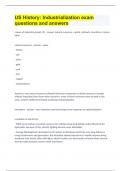
-
US History Industrialization exam questions and answers
- Exam (elaborations) • 15 pages • 2023
-
- $15.99
- + learn more
causes of industrial growth (5) natural resources, capital, railroads, inventions, human labor natural resources - water - timber - soil - silver - gold - coal - iron - copper - oil/petroleum America's vast natural resources allowed American companies to obtain resources cheaply without importing them from other countries. many of these resources were located in the west. western settlement helped accelerate industrialization. inventions - new inventions and technolo...
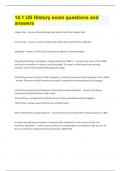
-
14.1 US History exam questions and answers
- Exam (elaborations) • 3 pages • 2023
- Available in package deal
-
- $15.49
- + learn more
clipper ship ship with sleek hulls and tall sails that clipped sails morse code a system of dots and dashes that represent the alphabet telegraph a device that used electric signals to send messages How did technology and industry change during the 1800's? early years of the 1800s had much innovation in industry and technology. The ways in which Americans worked, traveled, and communicated suffered good change. What three areas of America's life changed as a res...
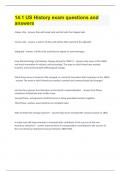
-
Chapter 14 Study Guide with 100% correct answers
- Exam (elaborations) • 3 pages • 2023
- Available in package deal
-
- $14.99
- + learn more
Why was petroleum in high demand even before the invention of the automobile? Because it could be turned into kerosene. Laissez-faire relies on what to regulate prices and wages? On supply and demand. During the early days of industrialization, many members of Congress believed that tariffs were necessary to do what? To help new American industries compete with large established European factories. What did economies of scale do to costs and prices? Advantages reaped by ...
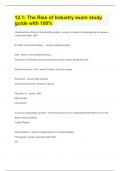
-
12.1 The Rise of Industry exam study guide with 100%
- Exam (elaborations) • 3 pages • 2023
- Available in package deal
-
- $13.99
- + learn more
Characteristics of Second Industrial Revolution Increase in technology due to advances in electricity after 1890 By 1900, US was the leading... Industrial nation GNP Gross National Product Total value of all goods and services produces by a country during one year Natural resources in US Timber, coal, iron, copper Petroleum High demand Turned into kerosene- lanterns & stoves Titusville, Pa 1859 Edwin Drake First oil well 3 sources of population...
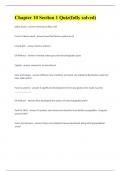
-
Chapter 10 Section 1 Quiz(fully solved).
- Exam (elaborations) • 1 pages • 2023
- Available in package deal
-
- $14.99
- + learn more
kerosene petroleum was in high demand because it could be turned into ___________ supply & demand laissez-faire relies on ___________ to regulate prices & wages help new American industries compete with large European factories during the early days of industrialization, many members of Congress believed that tariffs were necessary to lower costs & lower prices Economies of scale resulted in encourage rapid construction of tracks why did the government offer each...

Did you know that on average a seller on Stuvia earns $82 per month selling study resources? Hmm, hint, hint. Discover all about earning on Stuvia

